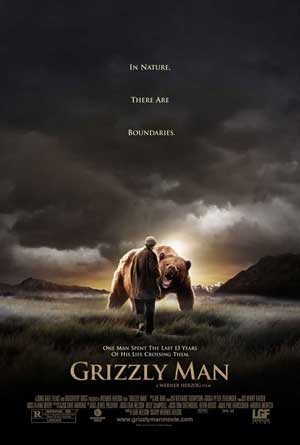 There are a lot of things I like about the 21st century, but chief among them might be the weird state of movies in the post-Internet world. I am going to go out on a limb here, but I think that there is a whole generation of film goers – maybe some of you reading this – who are being introduced to Werner Herzog through Zack Penn’s Incident at Loch Ness or this latest documentary from Herzog, Grizzly Man.
There are a lot of things I like about the 21st century, but chief among them might be the weird state of movies in the post-Internet world. I am going to go out on a limb here, but I think that there is a whole generation of film goers – maybe some of you reading this – who are being introduced to Werner Herzog through Zack Penn’s Incident at Loch Ness or this latest documentary from Herzog, Grizzly Man.
Herzog, of course, is one of the great madmen of modern cinema. Sitting next to him in a hotel room in Manhattan you might never guess that he constructed a boat and had it pulled over a mountain in order to get the most authenticity for his film Fitzcarraldo. You would certainly never assume that the man was for years involved in a love/hate working relationship with Klaus Kinski that supposedly often came close to homicide. And of course he once famously ate his shoe after losing a bet to documentarian Errol Morris.
So yeah, Herzog is pretty interesting. It takes a lot to rival the guy, but Timothy Treadwell did that. After 13 years living in the wilds of Alaska far too close to the grizzly bears that he loved, Timothy and his girlfriend were devoured by one of the animals. For the last five summers in the wild, Treadwell had carefully documented his activities, and Herzog has taken that footage and created a fascinating and disturbing documentary.
And now after years of madness, it’s a mockumentary and the story of a doomed weirdo that Leonardo DiCaprio was once interested in making into a film that will make Herzog’s name anew for a younger crowd.
Q: How did you come across the story of Timothy Treadwell?
Herzog: There was a messy desk and somebody who was very friendly with me, shoved a piece of paper across, because I was looking for my car keys, and he thinks I spotted something in particular and shoves an article across on Timothy Treadwell and said to me, “Read this. We’re doing a film on him.” Actually, our producer Eric Nelson who does 150 hours yearly for National Geographic and PBS. I read it and rushed back and said to him “I’m going to do this film” even though he planned to do it himself. I started almost immediately and in 29 days, I shot and edited and delivered the film.
Q: How much original footage was there?
Herzog: My footage was well organized, it’s about half the film and the other half is Treadwell’s footage, which is probably some hundred hours.
Q: Did you watch all that?
Herzog: No, I didn’t have time for that because I edited the film in nine days, so watching this whole footage would have taken ten days. Some other people sifted through it, but they were well instructed and looked for specific things. I, of course, looked over their shoulders once in awhile and I saw about 15, 16, 18 hours of Treadwell’s footage, but only after I had shot [my own footage]. But I had a hunch there was something big in there, even though the only thing I had seen was a one-hour show that Treadwell put together himself, but that is a kind of a Prince Valiant guarding the bears, and they were fluffy bear cubs and bear fishing for salmon. I had a hunch that there was something behind all this, and it was a big surprise as it came. Incredible stuff that I found.
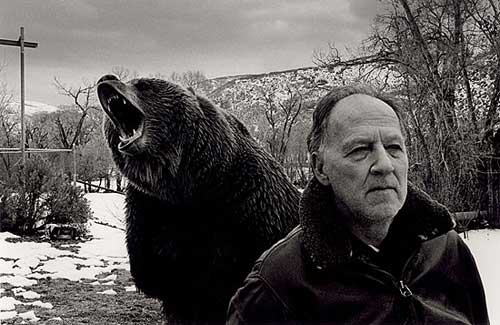
Q: Your narration is such a key part of the film. Did you write that after you edited the movie?
Herzog: No, while I was editing, I was writing and recording right away. You don’t have time when you edit a film of one hour and 45 minutes, but I was not really completely bound to a deadline. We only wanted to submit it to the Sundance Film Festival in time, and I always said that I’m not making a film for a festival. If I happen to finish it fast, why not showing it in a first version to Sundance? I’m good as a storyteller, and it comes easy to me, so there’s nothing special. Other people edit a film in five days.
Q: You talk about the thing that surprised you when you were going through the footage. What was that?
Herzog: Well, it was only partially a surprise, but the intensity of the footage was unexpected. It was always clear to me that it wouldn’t be a film on wild nature, that it would be much more a film on our nature. And looking deep into every human being is an abyss and you get vertigo looking into it, and of course, Treadwell is a very complex character full of doubts and self-aggrandization. Full of demons that haunt him and exhilarations and swings in mood and seeing a mission that he finds himself into and being almost paranoid for moments and being very sane and very clear at others. It’s not that I can say I expected one certain type of character. I just kept completely open and I show him in all his contradictions.
Q: In the film, you say that your view on nature is very different from Treadwell’s.
Herzog: Sure, and I have an ongoing argument with him throughout the course of the film.
Q: Considering you are coming at it from a different point of view than he did, do you think that it was inevitable that this was going to happen to him or do you think that it was the result of some carelessness just that one time?
Herzog: No, I think it was not a careleness at one specific time. He was simply too close to the bears for too long a period of time, and I believe that the National Park Service set up some rules for human beings that are not just quirky and a caprice of the park service. One of the rules says you have to keep a distance of one hundred yards from the bear and one hundred fifty yards minimum from a female bear with cubs. It is not the right thing to walk up a very big bear and touch his nose with your finger.
Sure, you are in a certain danger, but we should not exaggerate the danger. Grizzly bears normally do not kill and attack human beings. It doesn’t happen very often. Statistics are clear since 1903 or so, there were statistics in Alaska, and more than a hundred years not more than 12 or 14 people got killed by grizzly bears. Many, many more people got killed by moose, and about 800 times more Americans got killed by wasps that stung them. The polar bear, of course, is dangerous, because he’s out for mammals of human size. He eats walrus, whatever. If you step into the perimeter of a polar bear, you better pray for the next helicopter to lift you out of this.
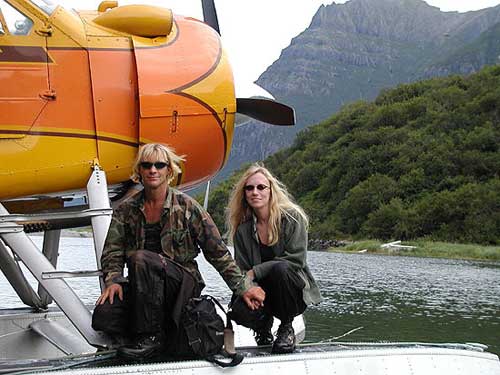
Q: When you shot your footage, and interviewed Treadwell’s friends, did any of them say they wished they had gotten him mental help? Weren’t they concerned by the way he was living and the way he was acting like a bear?
Herzog: Well, they probably did not know that he would go down on his knees and hands and woof at the bear and behave like the bear and sing to the bears. They probably did not know that, but his video camera knew that, and it was an intimate tool that he used. He would set up his tripod, step in front of the camera, and he did not publish it. Apparently, he planned a big movie with him as the rock star Prince Valiant, and of course, I give him credit and give him space for being a big star. And I give him credit for being a grandiose filmmaker. He has some footage that we have not seen ever before in our lives of grandiose beauty, and at the same time, of course, he was disturbed and he was partially paranoid in moments, and he was very sane in other moments and in depressed moods and wonderful moods how he feels about himself and what a great guy he is. So everything that makes us human beings was right in him.
Q: He believed that he is protecting the bears. Do you think there was any truth in that?
Herzog: For him, it was probably a truth that he adopted. He probably believed in it. I wouldn’t doubt that, but we do not know as we do not have the chance to speak to him anymore. But you don’t hold out for thirteen summers with grizzly bears without having a deep conviction inside of you, whether that conviction is right or wrong doesn’t really matter. In the film at the end, it says it does not matter how right or how wrong Treadwell was, there’s something much bigger out there, and of course the moment I found him stumbling across my path, I never looked out for him but these characters stumble across me, and I instantly knew there was something very very big out there.
Q: So in that time, out of the 13 summers, he’s never shared any of that footage with any of his friends?
Herzog: Oh, sure, he showed some of it and he published it like in the one hour show that I saw, but he apparently wanted to publish it one day and be the big star of a big movie. Of course, in my film, you can see how methodical he was. And sometimes, when he films fifteen takes, he’s very selective. We have take #2, take #5, take #14 and 15. Four takes out of fifteen, and he numbers them, but all the rest is erased, so he was already selective, he was pre-editing, he was thinking about a big movie, and I think it is a very lucky coincidence that I put his footage into a structure and made everything that he did productive for a screen. He didn’t have that discipline, and of course, I’m extremely lucky that I found these things and I believe we complement each other.
Q: His girlfriend Amy is this mysterious character in the film because she’s not in the footage and her family wouldn’t work with you…
Herzog: No, not work with me. That’s the wrong impression. Her family held a family council, and they decided that they would not appear in public at all, no matter whether I did something or anyone else. You come with your radio and try to interview them, the family counsel would point out to the same decision. And of course, you respect that. There’s no argument, you have to respect it. Since Treadwell kept hiding her presence and shot her only maybe 30 seconds out of 100 hours, because he tried to stylize himself as the lone warrior out there, the lone ranger, and it didn’t fit into this image that he tried to create of himself being the lonesome guardian, the lonesome eco-warrior out there to protect the bears. And of course, it is questionable how much do you protect 1,200 pounds grizzly bear by standing three feet away from him? So it’s probably would have been more productive to wait out there in Hallow Bay and wait for boards and float-planes to land and tell them don’t get close to the bears, don’t even make an attempt to shoot them because I’m looking over you and what you’re doing.
Q: Many people will come to the movie out of a morbid curiosity. They may in fact know that the last moments of Timothy and Amy’s lives were recorded. How did you decide what to show and what to keep hidden? Was it a sensitivity towards Timothy’s friends and family?
Herzog: I have a sensitivity towards audiences as well, and there’s a very simple fact about our movie, go and try to find a snuff movie, but not a movie that I made.
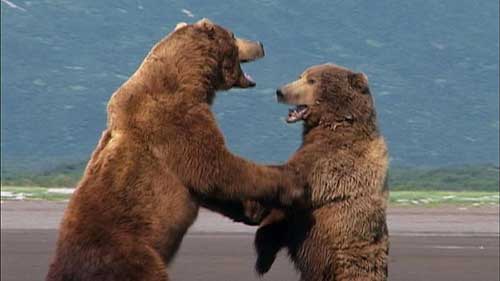
Q: There are moments in the film that feel staged or maybe rehearsed. Like the coroner who talks about the corpses.
Herzog: Well, the coroner is a good case, because he has to appear in court, he has to testify, and his manner is very reduced, cold matter-of-fact, get the fact-fact-fact-fact without emotion. And I said to him, ”Frank, you’re not Dr. Frank Falco”, and he’s a very philosophical and kind man and I said to him, “Frank, we’re not in court now. You’re not going to testify in court. We’re here in a film about a human being. I want to know what did you feel when you saw the remains. 28 lbs remains of Treadwell, 22 lbs of Amy Huegenard that were found out there in the field and the rest of the both in the stomach of the bear. I want to see a human being who is telling me this. I don’t want the coroner testifying in court.” And he looked at me and said, “I understood what you mean.” And he’s quite remarkable and wonderful.
Q: It seems like your career has been veering away from narrative films into more and more documentaries. Is that a conscious choice?
Herzog: No, that’s not true, because right after Grizzly Man, I did yet another film, a science fiction movie, The Wild Blue Yonder, and in a fortnight or so, I’m starting principal photography on a feature film with Christian Bale as the leading man in Thailand.
Q: Can you talk about that?
Herzog: No, no…it’s just…well, as long as I haven’t started photography, there might still be bumps in the road. You never know so…
Q: Just briefly, that film, Rescue Dawn, is based on events you had documented in a previous film, right?
Herzog: Yeah, but that’s a coincidence. It’s just unfinished business, so much that I know and was not in this documentary you’re speaking of, Little Dieter Needs to Fly. It doesn’t matter. So my last two films are going to be feature films. I just…it’s all movies for me.
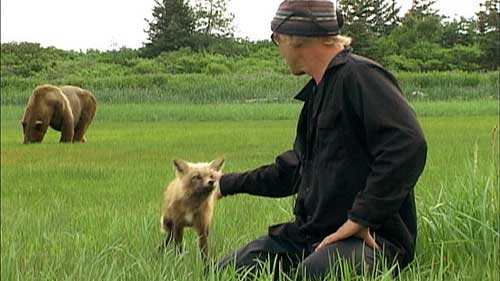
Q: We are told that Amy Huegenard was terribly afraid of the grizzlies. Was it her love for Timothy that took her out into the wild with him and these bears?
Herzog: We do not know. We do not have her to ask her. The most mysterious about all this is that Amy Huegenard, according to Treadwell’s diary, was at the point to leave him for good. She was desperate and wanted to return to California. She had to start a new job, but she called him something like “recklessly crazy”..no, sorry…”hellbent on destruction,” and now the great mystery is said. What is going on between men and women. At the moment of death, she doesn’t run. She stays and fights and she fights a huge bear. I mean, that is something like 1,000 pounds and runs as fast as a race horse and can travel something like 200 kilometers in 24 hours and can drag up a huge moose up a steep mountain…and can decapitate with one blow of a paw and can bite you to death with one single crunching bite. And she stays and apparently fights back with a frying pan. So we do not know. It is very mysterious and it I think touches a mystery of what is going on between men and women at the deepest level, yes. It speaks very much for a division that creation made between men and women.
Q: So I loved Incident at Loch Ness – are you and Zack going to work together again? Are there any plans for more along those lines? I know Zack has another project in the works.
Herzog: I might be in that film if I can manage..if I’m around and not filming something myself, I might be in his next film.
Q: How did you get involved in that in the first place?
Herzog: Oh, we became friends and he asked me. He knows that I’m a good actor. Well, I never accessed [the DVD commentary track] but we kept on the kind of hoax upon hoax upon a hoax even into the soundtrack until we, in a hidden link apparently, you can hear the real story. But I like everything that is connected with cinema: production, writing, editing, directing, acting. I’ve been pretty good in Harmony Korine’s Julien Donkey Boy. Violent, base and dysfunctional and hostile and I’m doing alright so…
Q: Did you see Nessie while filming?
Herzog: Of course not, because it is only a figment of our collective fantasy, and of course, we need the monster. It’s like an ocean without monsters in its depth, it would be like sleep without dreams and that’s why we love them and need them.
Q: After the audiences see this film, will they have more respect for the grizzlies or do you think more people will be interested in taking the Treadwell path?
Herzog: I don’t think that anyone is going to follow Timothy Treadwell’s example. It’s too obvious, but of course, at the same time, people will see something essential in his mission that he adopted for himself. I believe that no one who sees the film and sees for his pleading for foxes and don’t hunt them, don’t hurt them will not be impressed. Nobody’s ever going to hunt a fox who’s seen that film.